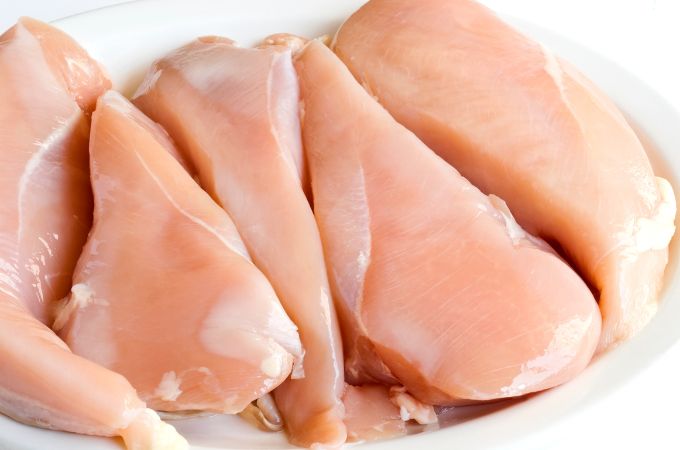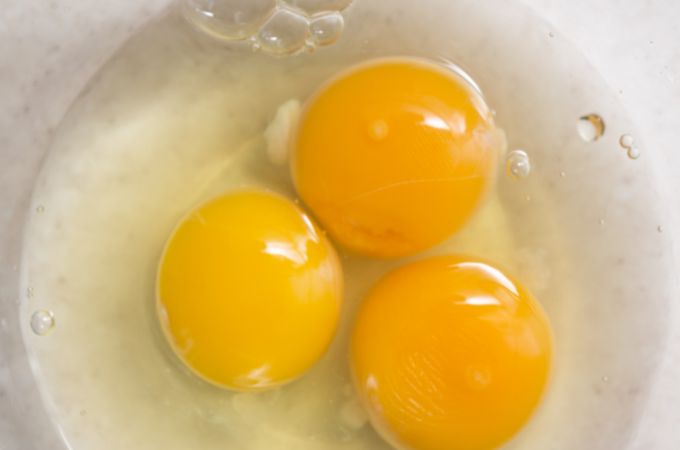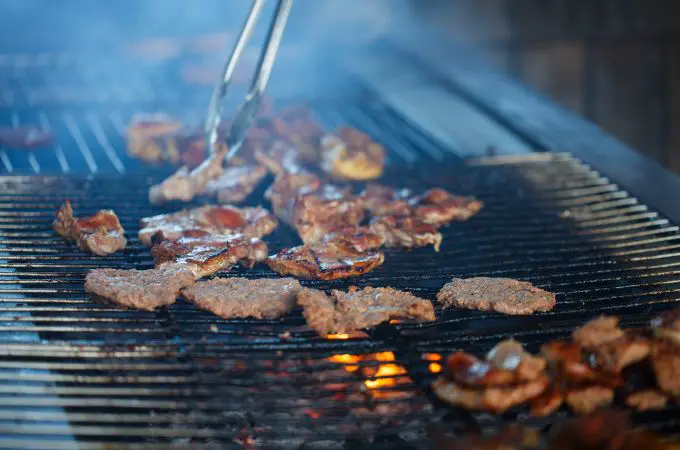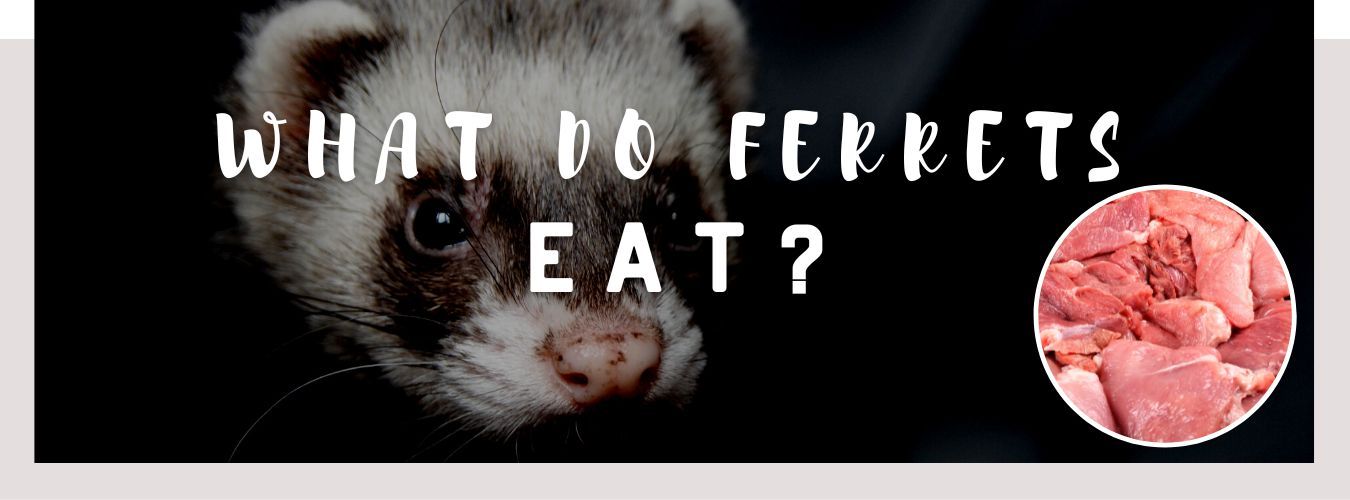
Ferrets are interesting creatures that can be kept as household pets. Although they are a bit on the wild side, these animals can give off doses of adrenaline-powered actions that are quite similar to dogs. In that sense, they are a friendly, active, and distinctly peculiar species.
Ferrets thrive in wild and domestic spaces. That said, you can tame and keep one very active, yet lovely ferret in your home. But doing that entails knowing everything about grooming ferrets including their feeding patterns.
So, as a ferret owner, you are obligated to understand the secret behind these creatures concerning their feeding habits. What gives ferrets energy and vitality? What do these creatures eat? Luckily for you, you can find answers to these questions in this article.
With complete approval from animal expert and content writer for “What Animals Eat” website, Annemarie Dutton, you can feed your ferrets the foods mentioned below.
Raw Feed
Since these animals are obligate carnivores, raw meat should be added to their feeding menu to balance their diet. Some raw meat choices you can entice your pet with are:
- Rabbit
- Lambs heart
- Turkey
- Minced beef
- Lamb chops
Ferrets may also feed on small prey like rodents, possums, chicks, and birds. Rest assured, your ferret will not revert to wild behavioral tendencies just because it enjoys raw meat. When fed in a normal proportion, you provide your ferrets and kits with the valuable nutrients their bodies need. It’s left to you to understand the value of these food types.
Raw Chicken
Ferrets can eat raw chicken. Chicken is highly rich in protein. Chicken breasts alone contain over 27 grams of protein and this is a third of their total body mass.
Wild ferrets feast on birds and small critters. This makes raw chicken an ideal food for even domesticated ferrets.
Raw chicken provides fat, considerable amounts of calories, and taurine which is an essential amino acid needed in ferrets. This amino acid helps in preventing enlarged heart diseases by strengthening the muscles in the heart. Also, the acid aids the development of certain neurons that are important to the central nervous systems in ferrets.

How Should Raw Chicken be Served To Ferrets?
Ferrets are about the same size as adult rabbits and puppies. Plus, their paws, feet, and mouth are considerably small to fit their size. Therefore, you need to feed your pet in bite-sized chunks.
Here’s how you can feed your ferret raw chicken:
- If frozen, let the chicken thaw first.
- Wash and clean the meat.
- Cut the raw chicken into bite-sized pieces.
- Leave the bone intact because this is where calcium lies in abundance. Ferrets have strong teeth and so, you don’t have to worry about any implications that may arise from the chewing bone.
- Feed your pet with raw chicken flesh, as well as the offals. Ferrets love all chicken parts including the thigh and wings.
- Remove the intestines so that your ferret does not consume the fecal waste of the chicken. At the same time, this will ensure that parasites in the chicken’s intestines will not enter your ferret’s system.
Unlike wild ferrets that are adept hunters who can feed on big pieces of meat without reducing them to bits first, tamed ferrets need to be treated delicately and prudently. This way, they can be trained to behave accordingly in the home.
What are the risks involved when ferrets eat raw chicken?
Raw chicken may contain harmful bacteria like E. coli, salmonella, campylobacter, and many others which could cause food poisoning and other serious illnesses in ferrets.
If bought from an unreliable source or stored improperly, bacteria can grow on raw chicken. So, keep the raw chicken frozen at about 40°F or less and ensure that leftovers are refrigerated immediately.
Lastly, feed your pet in moderation. As agreed by Annemarie, a few pieces of chicken daily will suffice. Feeding your pet full chicken more than twice a week will likely expose them to bacteria and parasites and excess protein intake which is not right for trained ferrets and kits.
Raw Egg
According to Akeem Eletu, another writer on What Animals Eat, raw eggs can be added to a ferret’s diet to balance up the basic protein and fat composition. In his article, he explained that a ferret’s diet should be a combination of 15-20% fat and 32-38% protein.
Raw eggs only serve as supplements and are sources of about 6 grams of digestible protein. Wild and domesticated ferrets feed on chicken, quail, goose, and duck eggs most times.
Eggs contain good amounts of calcium, fats, magnesium, protein, iron, potassium, zinc, and Vitamins A, B6, B12, D, and E. These nutrients, especially Vitamin D, help in the absorption of calcium which increases bone density. In addition, eggs boost coat and skin health and help decrease the likelihood of hairballs forming during shedding season.
You might also like: Can Ferrets Eat Fish?
You can feed your ferret raw eggs by cooking them or beating them and pouring them into a feeder for easy consumption. Egg shells can be ground and added to the eggs as well because it is the calcium deposit.

What are the risks involved in feeding raw eggs to Ferrets?
Experts at What Animals Eat advise that one to two eggs a week is enough to treat healthy ferrets. Intake can be increased to two to three eggs per week during shedding season to prevent bezoar, which is also known as a gastrointestinal obstruction in ferrets.
Raw eggs are supplements and not a staple food. Hence, ferrets must be fed in moderation. Over-consumption of eggs can cause constipation and biotin deficiency where the ferrets’ hair, skin, and nails are affected. So be careful about the amount you feed our ferret.
If it appears that your pet is growing too much and becoming obese, then you must only serve the egg white and powdered shells. Egg yolks contain high amounts of fat, so you have to remove them to balance up your ferret’s diet.
Cat Food
Ferrets can eat cat food. Like ferrets, cats are obligate carnivores, so they equally have a meat diet as well. Both animals have similar dietary requirements:
- Both need plant supplements and also raw meat additives daily.
- Both depend on foods with a good supply of taurine, an essential amino acid with heart and central nervous system benefits.
Cat food is rich in protein which builds up body mass and strengthens muscles. But they are to be used as supplements and not long-term staples. Ferrets are free to try both wet and dry cat food. So it’s left to you as the owner to monitor and take note of the particular kind of cat food your pet likes.
Wet Cat Food
Wet cat food contains protein and other essential nutrients like fats, vitamins, taurine, and minerals. In them, your ferret can consume iron, which helps to improve tissue and blood; biotin, which improves skin quality and regulates the release of energy during metabolism; and zinc, which aids the development and strengthening of the immune system, eyes, bones, and skin.
Also, if you want to keep your pet hydrated, wet cat food is a perfect tool for that.
Is Wet Cat Food Safe For Ferrets?
Yes, it is safe for both young and adult ferrets. But the thing is, it is not a staple food for ferrets. As a pet owner, treat cat food as basic supplements for the supply of a good protein+fats ratio.
While cat food is safe for consumption in ferrets, it is not enough to meet their high nutritional requirements needs. Plus, ferrets are picky eaters when it comes to non-meat food, so there’s a good chance your pet may not like or feel motivated enough to eat cat food.
But if your pet does, in fact, like wet cat food, then you should be careful not to overfeed them. Ferrets have a shorter digestive tract that cannot absorb nutrients adequately. Therefore, over-consumption may lead to some health concerns.
Dry Cat Food
When you have run out of meat or are in the mood to give your ferret a treat, you can go for dry cat food like cat biscuits. But you need to ensure that such food is grain-free and fiber-free.
Dry cat food provides the same health benefits as wet cat food, especially in the supply of amino and fatty acids. This feed makes an excellent snack choice for ferrets. However, you have to be careful of the kind of cat food you feed your ferret. Consult a vet for more advice and better recommendations if you can.
Cooked Meat
As earlier stated, ferrets love meat and can only digest them in its raw form. But if you are a firm believer in training your pets to eat cooked meals, then you can still get along quite well with your ferret if you feed it cooked meat.
But there’s a catch- cooked meat should be considered a treat and not a regular staple food. This is because most of the nutrients in the meat will be lost when boiled, roasted, or grilled. Although true, cooked meat still has a good deal of nutrients to supply. This includes
- Zinc, which provides a healthy coat and skin for ferrets;
- Iron, which helps in the prevention of anemia and builds red blood cells;
- An amino acid for heart and muscle development; and
- Vitamin B12 for the development of bones and red blood cells.
In essence, cooked meat isn’t a completely bad option. However, it may not be an entirely good one either.
You might also like: Can Ferrets Eat Cheese?
Is cooked meat safe for consumption in ferrets?

As a snack option, yes. But as a regular staple food, no. This is because most of the nutrients that ferrets need in the meat will be lost when it’s cooked. Additionally, spices, seasonings, and flavorings can be health risks, regardless of whether they are natural or artificial.
You should note that cooked meat must not be fed to baby ferrets as a treat or staple meal.
Ferrets have a sensitive digestive tract. As such, they cannot digest food other than raw meat properly. So if you are to feed them cooked meat, ensure that it is prepared without ingredients like salt, pepper, garlic, and other seasonings.
Cooked meat should not be fed to ferrets constantly. If you train your ferret to become used to cooked meat at the expense of raw ones, you pave the way for more health risks because they are not eating their meals according to their nutritional needs.
So serve your pet-cooked meat in little quantities on rare occasions and make sure they are not overcooked as this will kill more amounts of nutrients in the meat.
Foods You Should Not Feed Ferrets
Ferrets cannot digest nutrients easily. So, Akeem advises that they have to maintain an exclusive meat diet to prevent severe health problems.
The American Ferrets Association warns against feeding ferrets any of the edibles outlined below because they are health hazards to these carnivores:
- Fruits.
- Cheese.
- Chocolate.
- Peanut Butter.
In some cases, your ferret may like some of these foods. For instance, ferrets can chew carrots depending on their mood. But this doesn’t add any nutritional benefit to their bodies and can result in digestion problems. The same thing applies to cheese.
So don’t get carried away when your pet eats any of the aforementioned foods and also, don’t try to make it a habit for them. If fed any of this food, ferrets can have health issues such as:
- Diarrhea.
- Vomiting.
- Cancer.
- Dehydration.
- Organ failure.
- Dental rot.
Try as much as possible to keep your ferret away from these selections and if they have consumed a significant amount of them, ensure that you consult a vet for a check-up.
Conclusion
Ferrets are adorable creatures of nature. They are very friendly with humans and their active lifestyle is quite enjoyable to watch. As obligate carnivores, they only have select foods from which they derive all the necessary nutrients needed for good performance. This includes raw meat, cat food, raw eggs, and in some rare cases, cooked meat.
Many people run away from ferrets due to their meat-loving nature. However, these animals can be litter-trained and domesticated to adapt to certain food standards. Therefore, you can train ferrets to eat cooked food, fish, and processed food. However, you need to draw the line when it comes to chocolates, peanut butter, fruits, and vegetables.
Check our guides on these specific foods for Ferrets









